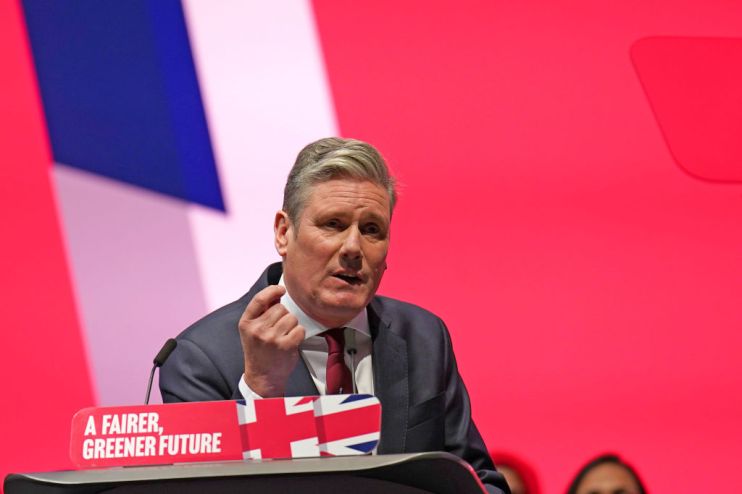Labour must present clear vision for UK’s future energy agenda

Energy secretary Claire Coutinho outlined the government’s reformed approach to net zero and climate change in an intense grilling from Sophy Ridge last week, following her flagship speech at the Conservative party conference.
She warned that “if you push people too far you lose the cause of climate change,” an issue she was “really passionate” about.
There is a sensible argument for ensuring that the transition to low carbon energy and greener lifestyles is gradual, fair and does not require Brits to bear the brunt of the costs involved in reducing the country’s reliance on fossil fuels.
This has characterised Prime Minister Rishi Sunak’s recent rowback of climate pledges, such as delaying the shift from fossil fuel powered cars and boilers to greener solutions like electric vehicles and heat pumps.
It also might be politically savvy – with the Tories aiming to turn the pace of net zero into a wedge issue, characterising Labour as radical and out of touch, in comparison to their proportionate, common-sense approach.
Conservative policy shift comes too late
Polling on Sunak’s net zero shift has so far been mixed, but mixed is a welcome contrast to the unanimous electoral surveys of the past 12-18 months which have placed Labour in a commanding lead ahead of the next election.
The problem with this is two-fold.
Firstly, the Conservatives’ rhetoric is a U-turn on its formerly consistent outlook on net zero, which risks spooking investors looking at potential projects in the UK.
There have already been several high-profile withdrawals of financial support for upcoming renewable developments in recent months amid concerns of insufficient government for clean energy developments, while high profile businesses such as Ford and Vauxhall have publicly criticised the government’s latest decisions.
The second problem is that the Conservatives are struggling to present Labour’s approach to energy policy as extreme, hence the recent references to fictitious claims around meat taxes and 15-minute cities.
Instead, Labour’s issue appears to be that it has no real agenda, as it begins its own conference in Liverpool.
Labour’s balancing act on energy policy
Earlier this year, shadow chancellor Rachel Reeves appeared to win an internal battle with shadow climate secretary Ed Miliband over the party’s fiscal credibility – scaling back plans to borrow £28bn per year to invest in green jobs and industry in the first year of taking office.
Instead, funds would be boosted over the course of Labour’s potential first parliament.
While this will help nullify a Conservative party attack line over green radicalism and a lack of fiscal credibility, the danger is it makes Labour appear bereft of ideas
With the opposition in the midst of its own conference, Labour has so far sought to ensure the next election is a referendum on the Conservatives – with the government struggling with a cost-of-living crisis and a lingering economic downturn since the pandemic.
This has been effective, but now it needs to be presenting a policy platform that makes the party fit for government: competent, compassionate and distinct from the Conservatives.
However, there are encouraging signs this could finally be changing, with Reeves expected to unveil plans to accelerate the planning process for critical national infrastructure at her conference speech later today.
This includes renewable projects such as battery factories and onshore wind farms, alongside 5G infrastructure and transport.
Such measures are exactly the approach Labour should be taking, boosting green projects while sustaining fiscal credibility and not putting households under a heavy financial burden.
Labour should also push forward with long gestating plans in Whitehall to split the costly price of gas from the cheaper generation price of renewables – easing people’s bills more radically.
Another area is grid reform, where Sunak and National Grid have been slow in enabling private developers to make their own connections to speed up projects.
These are decisions it can make rapidly and credibly before tackling the longer-term costlier energy challenges such as declining production in the North Sea – with Labour against new projects – and the UK’s dependence on China for crucial minerals for electric vehicles and wind turbines.
It should also consider policies that will attract initial criticism, but which would win over voters.
For instance, it could reinstate plans to enforce insulation requirements on landlords, which is not just environmentally friendly, but will stop renters shivering every winter in their temporary homes.
Landlords will trigger a backlash, but as they are hardly a Labour voting constituent, it is a risk worth taking – alongside the inevitable nimby-driven hostility to any planning reforms.
With Starmer set to make his own speech later this week, all eyes will be on how he continues makes Labour distinct from the Conservatives while ensuring its hard-regained sense of credibility is sustained.